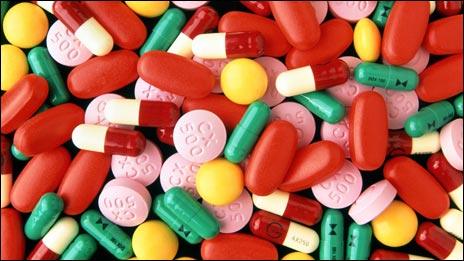Action on antibiotics
- Published
- comments

NDM-1 has been found in E.coli bacteria
Ever since I've been reporting on science and health, there have been dire warnings of a return to the pre-antibiotic era.
"Resistance to antibiotics and other anti-infective agents constitutes a major threat to public health, and ought to be recognised as such more widely than it is at present."
That statement could have been written today, but was the conclusion of a House of Lords Science and Technology Committee report, external in 1998.
In 2011, it seems, little has changed. Numerous articles and calls to action have been issued to coincide with European Antibiotic Awareness Day.
Marc Sprenger, Director, European Centre for Disease Prevention & Control said: "The need for concerted action to curb growing resistance to antibiotics is now critical, with the establishment of resistance to the last line of antibiotics being reported to ECDC from several European countries for the first time.
"Failure to act will mean that treatment options for patients with bloodstream infections, pneumonia, and urinary tract infections in hospitals will be severely limited."
Lethal
Take the case of Klebsiella pneumonia, a hospital superbug, which can cause lethal infections.
It is commonly treated using carbapenems, a powerful class of antibiotics.
But data released by the ECDC, external shows a rise in the percentage of carbapenem-resistant K. pneumonia.
Although it remains a limited threat in the UK, in some countries like Italy and Greece 15%-50% of K. pneumonia from bloodstream infections were resistant to carbapenems.
Writing in the Lancet, external, Professor Laura Piddock from the Antimicrobial Agents Research Group, University of Birmingham, warned of a crisis due to the lack of new antibiotics: "The demise of antibacterial drug discovery brings the spectre of untreatable infections."
The majority of antibiotics in use were discovered several decades ago. Professor Piddock pointed out that 16 new antibacterial agents were approved and brought to market between 1983-1987, compared with less than four agents since 2008.
MRSA
The British Society for Antimicrobial Chemotherapy has launched the campaign group Antibiotic Action, external to call for greater investment and interest in this area.
It's not all bad news. It was only a few years ago that MRSA - Methicillin-resistant Staphylococcus aureus - was a major threat in UK hospitals. Two months ago MRSA rates in England hit their lowest level since records began.
But the evidence suggests other pathogens are ready to step in.
Resistance can arise due to a genetic mutation in bacteria which are normally susceptible to antibiotics. Although these bacteria may start small in number, this genetic adaptation gives them an advantage.
Professor Piddock told me: "Bacteria can grow very quickly, doubling in number in 20-30 minutes and they are good at sharing their DNA. So resistance can spread rapidly."
Failure to complete a course of antibiotics can also give micro-organisms - which may remain after symptoms have vanished - a chance to develop resistance.
Worrying
NDM-1 is an enzyme produced by some bacteria which makes them resistant to carbapenem antibiotics. There is particular concern about Gram-negative bacteria (like E.coli and K. pneumonia), due to their outer membrane which can prevent some antibiotics from penetrating the cell.
So far fewer than 100 patients in the UK have been reported as carrying NDM-1 bacteria. But there is concern that resistant strains could spread.
Some will assume that this is an example of scientists trying to frighten the public and ensure more funding for research and drug development. But there is no doubt that the inappropriate use of antibiotics is worrying.
I have met the families of several patients who died due to hospital superbugs and witnessed many lives saved by antibiotics. These medicines are neither a magic bullet, nor an endless resource.
It is depressing that a poll carried out by the Health Protection Agency found that a quarter of people wrongly believe antibiotics are effective against most coughs and colds.
Penicillin
Try this quiz, external from the US Centers for Disease Control and Prevention to test your knowledge of antibiotics.
If you are really interested in the subject, and find yourself near St Mary's Hospital in Paddington, you could visit the laboratory where the story of antibiotics began. The Alexander Fleming Laboratory Museum, external has a reconstruction of Fleming's lab where he discovered penicillin in 1928.
- Published18 November 2011

- Published11 August 2010
- Published23 August 2011